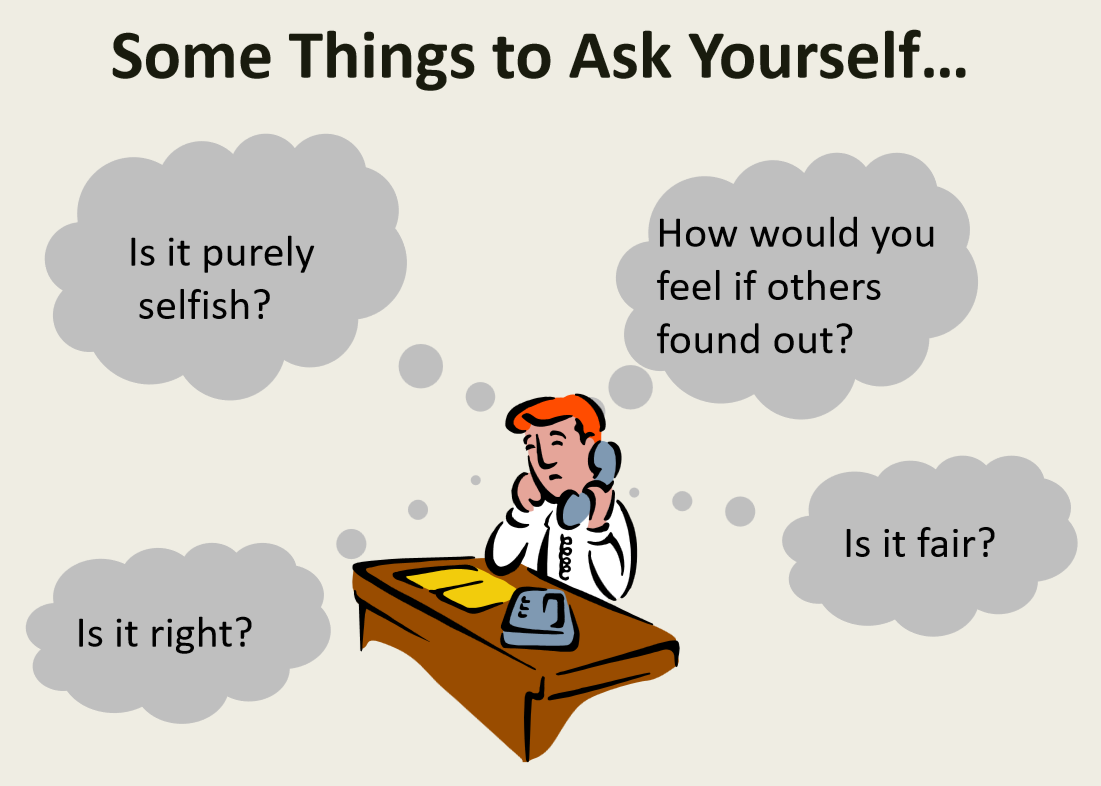BU288 - Ethics in Organizations
1/25
Earn XP
Description and Tags
Lecture 19 - Ethics in Organizations Summary: - Three Primary ethical decision criteria: -> Utilitarian, Rights, Justice ->...in a given situation, consider all three - do they produce the same conclusion? - Person and Situation can impact behaviour -> Personality -> Leaders' impact, organizational culture, organizational systems, stakeholders - When ethics is a concern, consider -> Impact on people, organization, and alternatives - Ethical/Unethical behaviour sends signals - There is no universal code of ethics, but organizations can do something to promote ethical behaviours
Name | Mastery | Learn | Test | Matching | Spaced |
|---|
No study sessions yet.
26 Terms
What is Ethics?
Ethics: Code of moral principles and values that governs the behaviours of a person or group with respect to what is right or wrong
Ethical values set standards as to what is good or bad in conduct and decision making
Orgs. that take ethics seriously tend to be more successful
What are the Three Ethical Principles / Decision Criteria?
Utilitarian
Rights
Justice
What is the Utilitarian (Ethical) Principle?
Utilitarian: Behaviour is ethical if it delivers the greatest good to the greatest number of people
Focused on outcomes; ends justify the means
Best Decision = action that produces the greatest good for the greatest number of people
What are the utilitarian theories?
Also known as “consequentialist” theories
Identify actions to take, and the harms/benefits the actions have for all relevant stakeholders
The best decision yields the greatest net benefits
The worst decision yields the greatest net harm
Key things to consider when applying the Utilitarian principle:
Key issues to consider:
Can you identify all the stakeholders?
Immediate? Distant?
Can you identify all the harms and benefits for each?
Can you really see what decision/action will produce the greatest good (and least harm) for the greatest number of people, for society overall?
What are the advantages of Utilitarian Principle?
Promotes efficiency and productivity
What are the disadvantages of Utilitarian Principle?
Disadvantages
Ignores rights of some individuals
Difficult to apply to values that cannot be easily quantified
Ex: Health, life, employment
What is the Rights (Ethical) Principle?
Rights: Behaviour is ethical if it respects the fundamental rights shared by all human beings
Ex: Charter of Rights and Freedoms, Free speech, due process, privacy, life and safety, etc.
Key things to consider when applying the rights principle:
Key issues to consider:
What are stakeholders’ rights?
Should I acknowledge, respect and guarantee such basic rights?
What are the advantages of Rights Principle?
Advantages:
Protects individuals from injury consistent with freedom and privacy
What are the disadvantages of Rights Principle?
Disadvantages:
Can create overly legalistic environment
Can hinder productivity and efficiency
Competing individuals’ rights
What is the Justice (Ethical) Principle?
Justice: Behaviour is ethical if it is fair and impartial in its treatment of people
Impose and enforce rules fairly
Equity
Key things to consider when applying the Justice principle:
Key issue to consider:
Is my action fair?
Fair outcomes (Distributive fairness)
Fair procedure (procedural fairness)
Fair treatment (interactional fairness)
What are the advantages of Justice Principle?
Advantages:
Protects interests of under-represented and less powerful
What are the disadvantages of Justice Principle?
Disadvantages:
Can encourage a sense of entitlement
Difficult to define “fairness” in dealing with different people with different needs and values
Can reduce risk-taking, innovation and productivity
List Ethical Behaviours:
Ethics underly our decisions
Honest communication
Ex: Evaluating employees candidly, advertising honestly
Fair Treatment
Ex: paying equitably, avoiding using people as scape-goats
Special Consideration (ex: helping people with disabilities)
Fair Competition
Ex: avoiding bribes and kickbacks
Responsibility to organization
Ex: Supporting the organization Vs. Self-Interest
Corporate Social Responsibility
Ex: Positive community impacts
Respect for the Law
Ex: Following labour laws
What are the two general causes of Unethical Behaviours?
Personality Causes (Bad Apple)
Situational Causes (Bad Barrel)
Explain “Personality Causes” for unethical behaviours:
Need for Power
Machiavellianism
Risk Taking
Moral Identity
Explain “Situational Causes” for unethical behaviours:
Gain
Ex: Anticipation of reward or lack of punishment
Role Conflict
Competition/Scarce Resources
Pressures to conform
Social modeling
Anonymity/Lack of Accountability
Organization/Industry Culture
What are strategies to make better ethical decisions?
Identify the impact on people
Stakeholders
What is the potential for harm?
Costs and benefits
Organizational Systems
How does the organization usually do business?
What policies/procedures help? Norms, laws, ethical codes, etc.
Choices
What other alternatives are available?
What are the risks of behaving ethically (or unethically)?

What is Corporate Social Responsibility (CSR)?
CSR: Management’s actions that contribute to the welfare and interest of all organizational stakeholders
Tends to be a positive relationship between ethical/socially responsible behaviour and financial results
What are examples of CSR?
For example:
Respect for environment
Environment stewardship
The relationship between the business and society
Ex: Contribute to better society
Fair treatment of employees, suppliers, customers, communities, etc.
Adhering to ethical values
Ex: Going beyond legal obligations
Employees responding positively to CSR relates to…
Organizational trust
Organizational identification
Work engagement
Organizational commitment
Job satisfaction
Job performance
Citizenship behaviours
Employees responding negatively to CSR relates to…
Turnover intentions
Organizational deviance
What are sources of ethical values in organizations?
Personal Ethics
Role of leaders (Role model, “Linking-pin”)
Organizational Culture
Embed ethical values
Organizational Systems
Employee selection, training, rewards
Presence of ethics codes
External Stakeholders
Reward/value ethical behaviour
Formal Structure and Systems???
Structure
Assigning ethics committee or ethics officer
Disclosure Mechanisms
Visibly reward ethical acts and punish unethical ones
Provide protective mechanisms so that employees are able to discuss ethical dilemmas and report behaviour against the code of ethics
Code of Ethics
Used by an increasing number of organizations
Not enough to have a policy, must also be followed
Training Programs